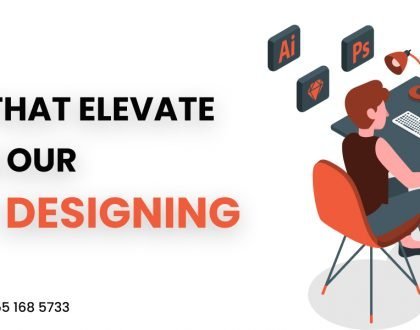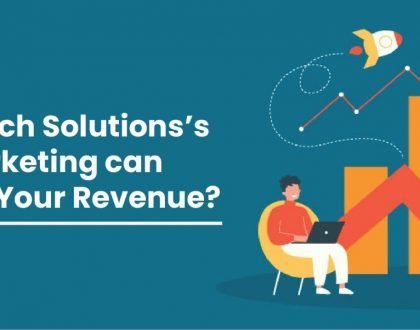Digital Transformation: How Technology is Revolutionizing Industries
by Ahsan Jamil
May 30, 2023
in CMS Development, Custom Web Development, E-Commerce Development, Mobile App Development, Search Engine Optimization, Social Media Marketing, UI/UX Designing, Website Development
No Comments
318
“You can’t delegate digital transformation for your company… You and your executives have to own it! Executives need to engage, embrace and adopt new ways of working with the latest and emerging technologies.”
— Barry Ross, Ross & Ross International
What is Digital Transformation
Digital Transformation is the future as it enables organizations to meet latest customer expectations and build a competitive position in this digital era. Digital transformation refers to the combination of digital technologies into different aspects of business operations. Due to technological advancement, it aimed at enhancing efficiency, productivity, customer experience, and competitive advantage.
A digital transformation strategy starts by asking 3 vital questions:
- Where are you today?
- Where do you want to be tomorrow?
- What are you going to do to get there?
Digital Transformation services
The following are some of the digital transformation services are adapted to meet the unique needs and goals of organizations across various industries:
- Innovation and Emerging technologies
- Change Management
- Technology Consulting
- Strategy and Roadmap development
Digital Transformation Consulting
Digital Transformation Consulting are the professional services to analyze the organizations’ requirements and provide the consultation. For eg. Stifftech is an IT company that provides consultation and strategic guidelines to the firms after getting their aims and objectives to attain successful outcomes.
Digital Transformation Solutions
Digital Transformation solutions refer to the technological tools, platforms, and systems that enable organizations to undergo digital transformation and achieve their desired results. Implementing the right combination of digital transformation solutions can empower organizations to drive innovation and achieve their business goals.
Technology Revolution through Digital Transformation
Following are the ways of how technology is revolutionizing industries through digital transformation:
Cloud Computing
Cloud Computing gives organizations the power to cordially innovate with cloud service providers and offers intelligent digital transformation solutions that are accessible, agile and adaptable and enables organizations to drive innovation, increase its efficiency and provide variable experiences to their customers.
Accessibility
Cloud computing provides organizations with easy access to evaluate resources, applications, and data from anywhere. Enabling a highly connected IT environment is a must and its impossible without the implementation of cloud computing.
Security and Reliability
Cloud service providers have a dedicated team of security experts to protect data and applications. With the help of cloud computing, organizations can steadily scale up or down their computing resources allowing them to respond quickly to the market opportunities.
Agility
Cloud computing enhances business agility through their operations and decision-making. With cloud-based infrastructure and services, organizations can revolve around a new environment within the organization
Automation
Automation can optimize organizational operations, which is essential as the organization grows. As an organization adds employees and gains customers, it needs systems to handle the increased workload. Automation involves a very broad range of technologies including robotics, expert systems and many more.
Artificial Intelligence (AI)
Artificial Intelligence (AI) refers to the process of developing systems with the capabilities of human intelligence and performing tasks such as the ability to learn from past experiences, reason, discover meaning, and generalize. It analyzes a large amount of data to learn and recommend what’s best for organization.
Below are some key aspects and applications of Artificial Intelligence
Natural Language Processing (NLP)
Natural language processing helps computers communicate with humans in their own language. For example, NLP makes it possible for computers to read text, hear speech, interpret it, measure sentiment and determine which parts are important.
Machine Learning
Machine learning focuses on enabling systems to learn from data without direct programming. It involves techniques such as supervised learning, unsupervised learning and reinforcement learning.
Robotics and Automation
Artificial Intelligence plays a vital role in robotics and automation. In robotics, robots are built and programmed to perform specific duties, make decisions and manipulate objects. They are widely used in industrial automation, healthcare and other sectors to perform tasks that are dangerous.
DATA ANALYTICS
Data analytics can help organizations to distinguish patterns and trends and understand customer behavior. It can improvise operational efficiency, optimize business processes, and solve complex problems. Some of the popular data analytics include:
Descriptive Analytics
Descriptive analytics involves summarizing and visualizing historical data to understand the past occurrences and gain a comprehensive view of the data. Descriptive analytics provides insights into patterns and key performance indicators (KPIs), enabling organizations to monitor and report on their performance.
Predictive Analytics
Predictive analytics provides probabilities and trends based on the prediction of historical data. Predictive analytics aims to go beyond descriptive analytics by providing insights into what is likely to happen in the future.
Prescriptive Analytics
Prescriptive analytics helps organizations achieve their goals, optimize resources and gain a competitive advantage in complex environments by suggesting the best actions to implement. Prescriptive analytics can be dynamic and provide recommendations. It not only provides recommendations but also helps in its implementation
Internet of Things (IoT)
Internet of Things is all about connecting things to the internet to enable communication and data sharing between them without any human intervention. As IoT is continually evolving, it has the potential to revolutionize industries, interact with the physical world by transforming the ways we live.
Machine Learning
Machine Learning is a subfield of artificial intelligence. It involves the development of mathematical and statistical techniques that allows machines to learn from data and enhance the performance of the organization overtime. In short, machine learning has the potential to automate tasks, improve decision-making, leading to evolution in different fields.
E-Commerce
E-Commerce in digital transformation has widely gained popularity during the pandemic. E-Commerce involves conducting business transactions, such as purchasing products, paying online and preparing the inventory through online platforms.
Augmented Reality and Virtual Reality (VR)
Augmented Reality (AR) is transforming industries by bridging the gap between the physical and digital worlds. As Augmented Reality is evolving, it leaves a continuous impact on digital transformation.
On the other hand, by implementing Virtual Reality (VR) organizations can enhance collaboration, improve training and education. Virtual Reality opens up new possibilities and opportunities for organizations across industries.
Mobile application
Mobile application has become an important component in data transformation. It has given us the freedom to interact with others from any location around the world.
“Your mobile device has quickly become the easiest portal into your digital self.”
– Phil Nickinson, Editor of Android Central
Competitive advantage
Competitive advantage refers to the unique capabilities and strengths that make it different among the competitors. It is the edge that a company has over its rivals and enables it to sustain profitability, generate higher revenue and attract customers. It’s important to note that competitive advantages can evolve over time.
Customer experience
Digital transformation focuses on customer experience that requires ongoing evaluation, adaptation and improvement. Customer experience is vital for digital transformation. Companies should reimagine the customer journey by developing new experiences that meet their demands, focusing on relationships.
Business agility and scalability
Business agility and scalability are the two important aspects of digital transformation that enable organizations to adapt, nurture and succeed in the organization.
Business Agility
Business agility is a method of continuous improvement in an organization and responds quickly to market changes. In data transformation, business agility is essential to stay competitive and navigate the evolving business landscape
Scalability
Scalability ensures that organizations can handle increased demand, growth, and technology-driven opportunities. Scalability is vital as businesses aim to leverage technology to expand their reach.
Conclusion
Digital Transformation is a transformative journey for organizations to thrive in the digital age and position themselves higher in their organization. Stifftech is also leveraging technology to edit the business operations and gain a competitive advantage with other organizations. Let’s make our lives easy by using digital transformation to lead an organization and avoid any industry disruption in this digital era.
Recommended Posts

E-Commerce website design company in Dubai
November 30, 2023

Graphics That Elevate Sales with Our Graphic Designing
October 11, 2023

How StiffTech Solutions’ Digital Marketing Can Skyrocket Your Revenue?
September 26, 2023
